Last night, I watched a couple of basic home invasion horror movies. The first was Death Game, a 1977 movie starring Seymour Cassel (the dad from Rushmore), Sondra Locke, and Colleen Camp.
Then I watched Knock Knock, which just came out; it’s directed by Eli Roth, and stars Keanu Reeves, Lorenza Izzo, and Ana de Armas.
Death Game is about a family man whose family leaves for the weekend, and then he gets a knock on the door: it’s two cute girls who can’t find the right address to a party they want to attend, and they’re drenched in rain and freezing. He lets them in, they seduce him, and then they reveal that they’re completely insane. They torture him, wreck his house, and commit a murder, before returning to the dad-torture. Knock Knock is about a family man whose family leaves for the weekend, and then… well, it’s a remake of Death Game, so I won’t go through the whole thing. It’s updated and changed for a modern era, to include social media and cellphones, basically; also, it can get way more explicit and gross:

It also has some kind of weird ideas about youth culture. Let’s get into it first with Death Game.
Spoilers ahead. Yarr. Ahoy.
Seymour Cassel is fantastic as the dad in the movie. He’s rockin’ the 70s old-man dad bod and moustache, and his house is perfect: really nice stereo, everything in muted 70s earth-tones and not a lot of natural light, shrubbery all around the front door. He’s celebrating his 40th birthday, and sees his wife and kids off for the weekend. That night, the girls show up, he lets them in, rebuffs a couple of advances, and then succumbs to their wily charms. That succumbing, by the way, is so weird and hilarious– straight-up porn music starts blaring, and then there’s about five minutes of double-exposed film, usually a long-shot of writhing bodies and a close-up of a face or an arm or something; it’s clearly meant to be hellaciously titillating, but it ends up looking like a weird flesh-tone squid occupying two or three dimensions at once, especially because the source film for this movie never had any sort of preservation or cleaning measures taken. The soundtrack pushes it over the edge into weird absurdity.
The next morning he wakes up and the girls are making breakfast. He joins them, and then it becomes clear that they’re straight-up insane, picking up eggs with their fingers and not using napkins and dredging pancakes through eggs and jelly and all manner of transgressions against polite society. The whole time during breakfast, the old man is quietly and civilly smoking and ashing into a little saucer. You know, like a grown man does. Until he tells them that they’re behaving like animals.
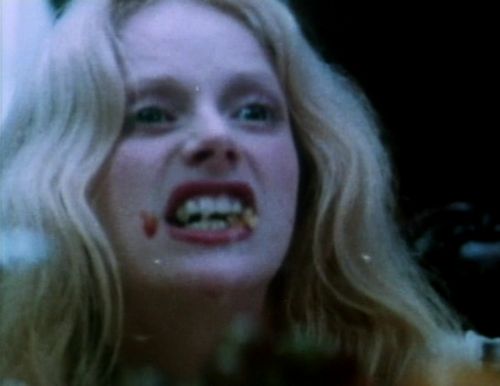
They start destroying his furniture and playing his stereo too loud and beating the shit out of him. He threatens to call the cops, but they tell him that they’re both underage. They tie him to a bed and continue their rampant destruction. This continues pretty much unabated for the rest of the movie. Locke and Camp both manage to strike a weird balance between malevolence and wide-eyed naivete: Camp, at several points, proclaims her actual fondness for the man that they’re victimizing, and Locke’s character seems to be operating as pure id, chaotic but not necessarily evil (except for a few points).
This movie’s kind of hard to pin down, thematically.
Maybe it’s about the 1970s perceived breakdown of social order, as represented here by the sheer barbarism of an untended bottle of ketchup pooling and spilling, splattered on the base of a fine silver serving platter, and staining the tablecloth:
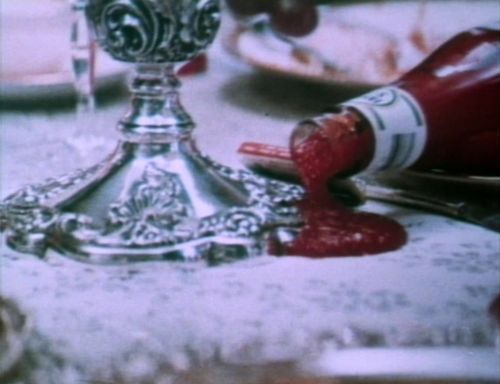
A shot which, no shit, lasts thirty-seven seconds. I know because I timed it.
Perhaps it’s a message about the things that go wrong when the lecherous older generation preys on the younger, as represented here by a shot of a rotten banana trailing up and down a milky-white thigh.
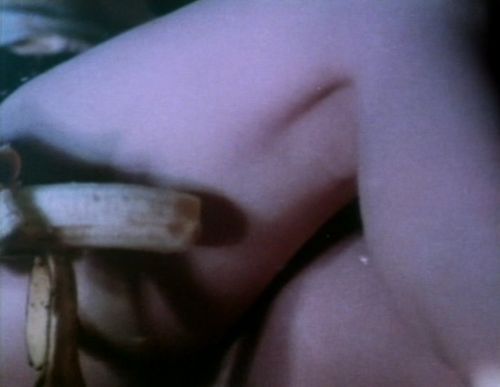
Maybe it’s about the new generation having no respect for the old, as represented by this shot of Max Fischer’s dad getting drenched in foodstuffs:
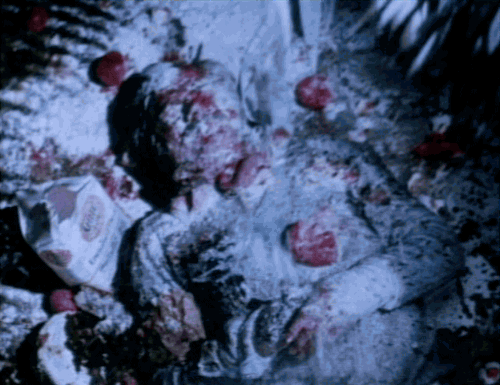
But in actuality, I think it’s probably just a weird exploitation movie that’s taking advantage of the relatively recent home invasion and multiple murders of the Manson Family, and the willingness of Sondra Locke and Colleen Camp to disrobe. That super-weird five-minute, flesh-toned, porno-soundtracked montage at the beginning defies any other description.

Oh, yeah, spoiler: in the last five seconds of the film, an SPCA van literally swerves around a corner out of nowhere and mows down both girls.
Now let’s move on to Knock Knock.
I have some problems with Eli Roth in general. He hasn’t made any movies that I have thoroughly and unabashedly loved. Don’t get me wrong, here, I like his movies just fine, especially Cabin Fever, but it always seems like there’s a running thread through all of them of cruelty for the sake of cruelty. The times when it works the best are the times when you, as an audience, have a character to empathize with– in Hostel, Paxton was a swaggery but ultimately good-natured character through which to encounter the mindless cruelty of the movie, and it made that movie much more palatable.
The problem is that all of Roth’s movies, aside from Hostel, fail to give you that empathetic character. Cabin Fever has Karen, but she’s the first to go, and then we’re stuck with a bunch of assholes. Hostel 2 never intends to let us empathize with any of the characters– it’s just intended to be a cartoonish, grisly murderfest from minute one. Knock Knock continues that trend, with weird douche-dad Keanu Reeves (whose wife and kids are the only decent characters in the movie, and they’re only onscreen for the first ten minutes).
The opening shots of this movie are a slow tracking shot through the house, where literally every wall has huge photographs of Keanu and his family. Literally every wall. I can’t even tell if this is supposed to paint a picture of a family that’s deeply tied together and wants to display it to the world; or a deeply weird and narcissistic family member demanding representation; or just tell us that the family is tone-deaf when it comes to what normally passes for domestic decoration. I just know it’s fucking weird and immediately makes me wonder who these weird people are and dislike them. One row of pictures on the mantel? No problem. A few hanging pictures throughout the house? Hey, fine by me. Three-foot by three-foot studio shots on literally every wall in your house? There’s something wrong with you.
Anyway.
Ten minutes of footage showing us the happy family, blah blah, they leave for a weekend at the beach, blah blah, the girls show up at the door. He invites them in, blah blah. The one part of this movie that was really novel and fairly clever was that it actually incorporates modern technology in a legitimate and encompassing way– he calls the girls an Uber (or Uber-alike) and tracks its progress on his phone; because it’ll be a while, it gives him a chance to interact with them more, and turn down their initial advances.
Eventually blah blah he bangs them both, blah, then he wakes up, breakfast, blah. Then his wife FaceTimes him, and he runs out into the yard to take it. There’s an actually really well done hilarious moment where the two girls attempt to photobomb by doing the lady-front equivalent of a pressed ham:

Then blah blah blah, jailbait revelations, can’t call the cops, torture, bondage, makeup…
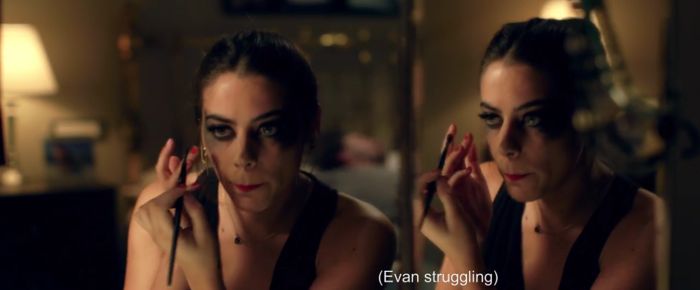
Throughout the torture, the two crazy girls are perpetually snarling at Keanu for being a philanderer and a pedo, which, you know, they’ve got a point. They’ve got none of the goofy naivete of Death Game here: these girls are psychopaths, cruel and smart and mean. Their motives are a bit more clear than in the original– they’re clearly taking revenge for something they’ve endured. There’s a running thread about de Armas’ character’s childhood that’s disgusting and awful.
At one point, they throw a mock trial, and Keanu defends himself by talking about how they threw themselves at him, referring to the girls’ showing up at his door unannounced and pressuring him into sexual compliance.
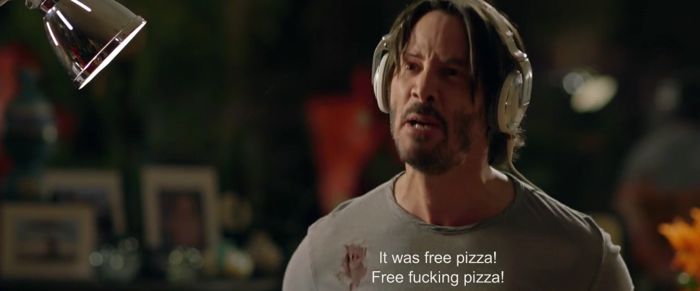
So, none of the main characters in this movie warrant any empathy at all. An SPCA van could have swerved around a corner halfway through this movie and mowed all of the characters down, then backed up and done it again until they were a patch of jelly on the road, and I wouldn’t have really cared. They’re all eminently unlikeable.

The reason this movie isn’t 100% hot garbage is just because of its use of technology: the Uber, the FaceTime, the cellphones-as-cameras, and then a “Twilight Zone”-y ending bit where the girls upload a sex tape to Facebook and Keanu has to sit there, buried in the dirt, and watch the comments roll in from all of his friends and loved ones. In an era where there’s a movement to 1) make a period piece to avoid modern tech altogether; 2) contrive extenuating circumstance to separate characters from their tech; or 3) inexplicably have all cell providers collude to provide “no service” areas when a phone is needed most, this is refreshing in that it full-on embraces modern technology and actually uses it in interesting ways to further the plot.
Now, some general notes on both movies, and a compare-and-contrast.
In Death Game, the old-man dad smokes as a signifier of maturity, while neither of the girls smoke. In Knock Knock, both girls smoke, a signifier of immaturity, while none of the adults do.
Another interesting saving grace in Knock Knock: they don’t hurt his pet. In Death Game, the girls hurt the dad’s pet, which is always among the cheapest, shittiest moves a horror flick can do to win empathy / sympathy / horror, and which almost always enrages me. Knock Knock sidesteps that, which is a point in its favor.
Keanu’s character is older than Cassel’s, but looks about twenty years younger. Chalk it up to all Cassel’s Cassavettes movies, I guess.


“Death Game” a much better.